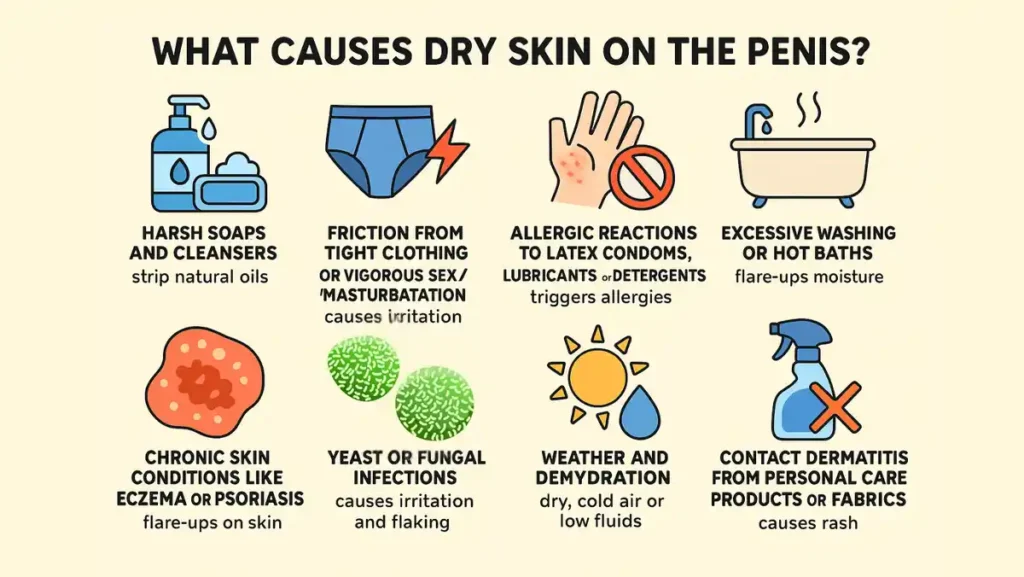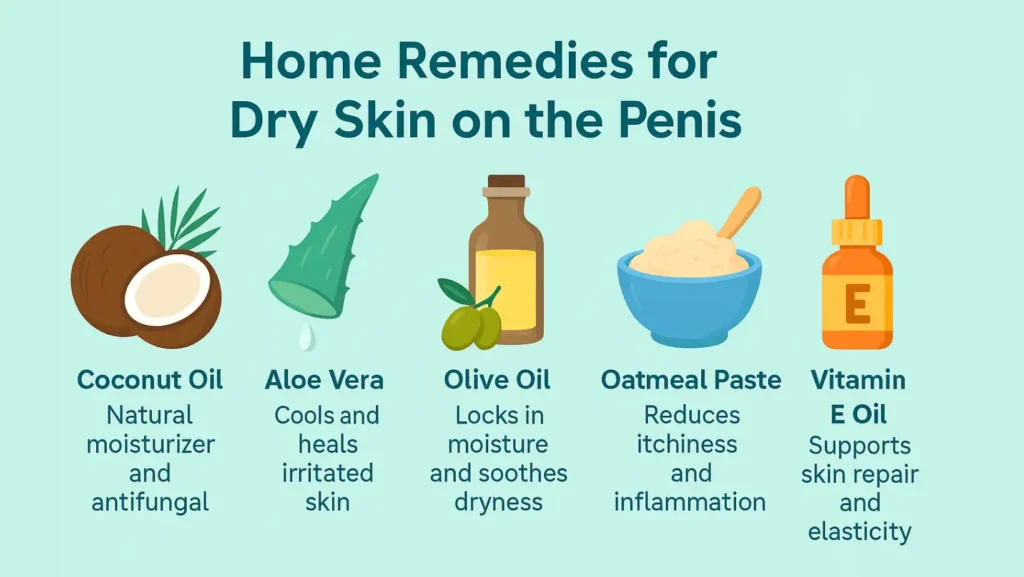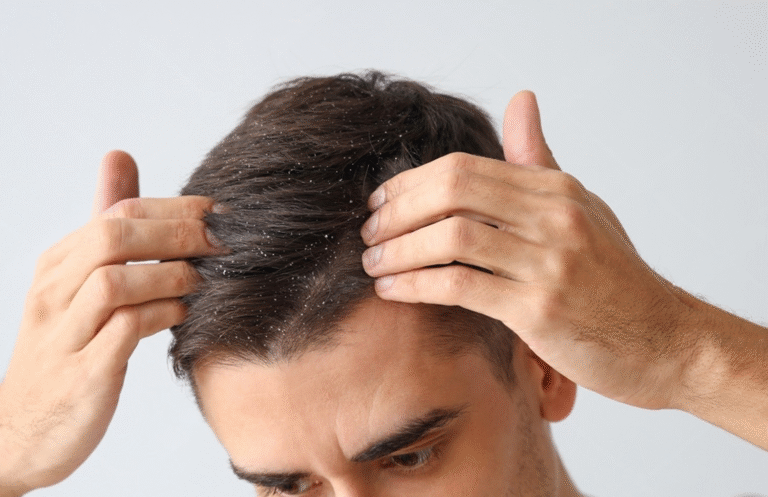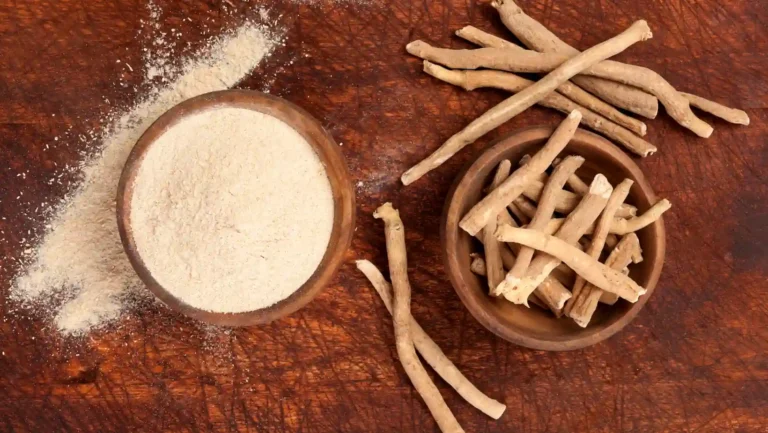Dry skin on the penis happens when the thin skin on your shaft or glans loses water and oil. You feel tightness, itch, sting, or peeling. You may also see redness or small cracks. Most cases improve with simple changes. A few cases need a doctor’s care. You will learn what causes it, how to spot warning signs, and the exact steps that fix it fast.
You will also learn how to keep the skin healthy so the problem does not come back. This is a direct, practical guide you can use today.
What Causes Dry Skin On The Penis?
1. Harsh Soaps And Cleansers
Many soaps use strong surfactants. These break down oil and dirt. They also strip your natural oils. The penile skin barrier then leaks water. You feel dry and tight. Fragrance and dyes increase irritation. Choose a mild, fragrance-free cleanser with balanced pH. Rinse well with warm water. Pat dry with a soft towel.
2. Friction From Tight Clothing Or Vigorous Sex/Masturbation
Rubbing removes surface oils and irritates nerve endings. Tight briefs trap heat and sweat. Long sessions increase chafing. You may notice sore spots, peeling, or tiny splits. Reduce friction. Use adequate lube during sex or masturbation. Pick breathable underwear. Take breaks during long sessions.
3. Allergic Reactions To Latex Condoms, Lubricants, Or Detergents
Latex, condom additives, or certain preservatives can trigger a contact allergy. Your skin turns red, dry, and itchy. Detergent residue in underwear can do the same. If symptoms start after sex or after changing detergent, suspect an allergy.
Try latex-free condoms made from polyisoprene or polyurethane. Switch to a hypoallergenic detergent and double rinse.
4. Excessive Washing Or Hot Baths
Hot water swells the outer skin layer. Long showers then strip lipids. Overwashing repeats the damage. Your skin starts a cycle of dryness and irritation. Keep showers short. Use warm water, not hot. Wash once or twice daily. Skip scrubbing tools on the glans.
5. Chronic Skin Conditions Like Eczema Or Psoriasis
Eczema weakens the barrier and causes itch. Psoriasis speeds skin turnover and can form plaques. In the groin, plaques often look smooth and red, not thick. Both conditions can mimic dry skin on the penis. They respond to emollients, trigger control, and short courses of doctor-directed medicine.
6. Yeast Or Fungal Infections Causing Irritation And Flaking
Candida yeast grows in warm, moist folds. It causes redness, burning, and scaling. Scratching then cracks the skin. Moisturizer alone will not clear a yeast rash. You need an antifungal cream if an infection is present. Keep the area dry to stop the cycle.
7. Weather And Dehydration
Cold air and indoor heating lower humidity. Water leaves the skin faster. Dehydration from low fluid intake worsens the problem. Sip water through the day. Apply a bland ointment right after bathing to trap moisture.
8. Contact Dermatitis From Personal Care Products Or Fabrics
Sprays, wipes, aftershaves, or fabric dyes can cause contact dermatitis. That means an irritant rash. You may feel burn, dryness, or a sharp line where the product touched. Remove the trigger. Use simple products with short ingredient lists.
Symptoms Of Penis Dryness And Irritation
Dry, Flaky, Or Rough Skin Texture
You may see small white flakes. The skin can look dull or ashy. It often feels gritty to the touch. A thin layer of ointment restores slip and comfort.
Redness, Tightness, Or Mild Burning Sensation
Inflamed skin looks pink or red. It feels tight after hot water or sex. Burning can appear with sweat or urine contact. Cooling water and a bland emollient calm this fast.
Itching Or Discomfort After Sex Or Urination
Friction during sex or masturbation exposes nerve endings. Urine salts sting small cracks. Rinse with lukewarm water after urination if needed. Pat dry. Seal with a thin ointment.
Peeling Or Cracking Skin In Severe Cases.
Deep dryness leads to fissures. These hurt with movement. Germs can enter more easily. Keep the area clean. Use an occlusive ointment. Seek care if cracks persist.
Sensitivity Or Pain During Movement Or Touch.
Chafed skin reacts to even soft fabric. Walking, sport, or sleep can be painful. Reduce friction. Wear soft cotton. Use a barrier balm until the skin heals.
Common Allergic Reactions That Cause Penis Dryness
Latex Allergy — Reaction To Condoms Or Gloves.
Latex allergy can cause redness, hives, swelling, and dryness. Symptoms can start soon after contact. Switch to non-latex condoms. Monitor your skin response.
Fragrance Or Alcohol In Soaps And Lubricants.
Fragrance blends and alcohol are common triggers. They sting thin skin and increase water loss. Choose fragrance-free, alcohol free options. Read every label.
Laundry Detergents Or Synthetic Fabrics Causing Irritation.
Detergent enzymes, optical brighteners, and dyes can linger in fabric. Heat and sweat push these into your skin. Choose a free and clear detergent. Add an extra rinse. Choose cotton over synthetics.
Personal Hygiene Wipes Or Antiseptics Disrupting Skin Balance.
Many wipes contain preservatives like MI or MCI. These can cause an allergy over time. Some wipes include alcohol. These dry the skin fast. Use water and a soft cloth instead.
Medical Conditions Behind Penis Dryness
Eczema: Chronic Itching And Flaking In Sensitive Areas
Eczema means a weak barrier and a quick itch cycle. You scratch, the skin breaks, and water escapes. Triggers include sweat, wool, and stress. Treat with regular emollients and trigger control. Doctors may add a low-strength topical steroid for short bursts. Nonsteroid options like calcineurin inhibitors can help thin skin safely when used as directed.
Psoriasis: Thick, Scaly Patches Around The Groin Or Base
Genital psoriasis can appear smooth and shiny, not thick. It still stings and feels tight. Friction worsens it. Doctors use low potency steroids or calcineurin inhibitors on the area. Moisturizers support the barrier and reduce flare risk.
Balanitis: Inflammation Of The Foreskin Or Head Of The Penis
Balanitis presents with redness, soreness, and sometimes discharge. Irritants, poor hygiene, yeast, or bacteria can be causes. Dryness often follows the inflammation phase. A clinician must confirm the cause. Treatment may include gentle cleansing, antifungals, or antibiotics in select cases.
Yeast Infections: Dryness With Redness And Odor
Candida can cause intense itch, red patches, and a thin white film. Odor can appear. Barrier creams alone do not work. You need an antifungal agent. Keep folds dry to prevent recurrence.
Diabetes: High Sugar Levels Increase Skin Irritation Risk
High glucose impairs immune defenses. Yeast and bacteria then grow more easily. Nerves can lose sensitivity over time. Recurrent rashes or slow healing are warning signs. Good glucose control lowers risk. See a clinician if infections repeat.
How To Treat Dry Skin On The Penis (Doctor-Approved Guide)
1. Use A Mild, Fragrance-Free Soap
Use a gentle cleanser with balanced pH. Avoid deodorant soaps and scrub tools. Wash once or twice daily. Rinse well. Pat dry. This protects the natural barrier.
2. Moisturize With Hypoallergenic Creams (Petroleum Jelly Or Aloe Vera)
Apply within three minutes of bathing to trap water. A thin coat of petroleum jelly seals the skin. Aloe gel can cool. Patch test any new product. Stop if stinging or redness appears.
3. Avoid Hot Showers Or Prolonged Water Exposure
Use warm water. Keep showers under ten minutes. Long baths swell and strip the outer layer. A quick rinse after heavy sweat is fine. Do not scrub.
4. Wear Breathable, Cotton Underwear
Cotton allows airflow and wicks sweat. Change damp underwear quickly. Sleep in loose shorts if you sweat at night. This reduces friction and yeast risk.
5. Avoid Scratching Or Harsh Rubbing
Scratching tears the surface and spreads germs. Tap, cool, or apply an emollient when itch strikes. Keep nails short. Use a soft cloth when drying.
6. Stop Using Irritants Like Scented Lotions Or Lubricants
Scan labels for fragrance, alcohol, menthol, and dyes. Avoid warming or tingling additives. Choose short ingredient lists. Less is safer on thin skin.
7. Apply A Doctor-Prescribed Antifungal Or Steroid Cream If Infection Is Suspected
A yeast rash needs an antifungal. Widespread redness with itch may need a short course of a low-strength steroid. The genital area absorbs drugs quickly. Use only as directed. Do not extend use without advice.
Home Remedies For Dry Skin On The Penis
Coconut Oil: Natural Moisturizer And Antifungal
Virgin coconut oil reduces water loss and has mild antifungal action. Use a thin layer after bathing. Too much oil traps heat and sweat. Stop if you notice burning.
Aloe Vera: Cools And Heals Irritated Skin
Pure aloe gel calms the sting and supports healing. Avoid products with fragrance or alcohol. Apply a light layer and let it dry before dressing.
Olive Oil: Locks In Moisture And Soothes Dryness
Olive oil creates a light seal. One or two drops are enough. Thick coats can clog pores. Combine with regular underwear changes to avoid trapped sweat.
Oatmeal Paste: Reduces Itchiness And Inflammation
Colloidal oatmeal eases itch by binding to the skin. Mix with lukewarm water into a soft paste. Apply for ten minutes. Rinse and pat dry.
Vitamin E Oil: Supports Skin Repair And Elasticity
Vitamin E can help some, but it can also irritate others. Test a tiny spot first. If it suits your skin, apply a small amount two or three times weekly.
When To See A Doctor
Persistent Dryness Lasting More Than A Week
If you follow the plan for seven days with no relief, seek care. You may have eczema, psoriasis, or an infection that needs prescriptions.
Cracks, Bleeding, Or Painful Peeling
Deep fissures raise infection risk. They hurt and heal slowly without help. Medical care protects the skin and speeds repair.
Accompanying Rash, Redness, Or Unusual Discharge
These signs point to balanitis or infection. A clinician can culture or examine the area. Correct treatment depends on the cause.
Burning During Urination Or Sexual Activity
This suggests cracks, infection, or a strong irritant response. Pause sexual activity until healed. See a clinician for targeted therapy.
Recurring Dryness Despite Moisturizers Or Home Care
Recurrent flares signal an ongoing trigger. Allergy testing or glucose checks may be needed. A plan based on findings prevents repeat issues.
Preventing Penis Dryness And Itching
Limit Washing To Once Or Twice Daily With Gentle Cleansers
Frequent washing damages the barrier. Consistent, gentle care keeps the skin calm. Rinse sweat, but avoid harsh scrubbing.
Always Dry The Area Properly After Bathing
Moist folds invite yeast. Pat dry without rubbing. Use a cool hair dryer on low if needed. Apply a thin layer of ointment after drying.
Use Water-Based, Hypoallergenic Lubricants
These reduce friction during sex or masturbation. Reapply when needed. Avoid heavy scents or warming agents. This lowers the chance of penis skin dryness and itching.
Avoid Synthetic Fabrics
Cotton lowers heat and sweat. If you must wear synthetics for sport, change out soon after. Shower, pat dry, then moisturize.
Stay Hydrated And Maintain Balanced Nutrition.
Skin needs water, protein, healthy fats, and vitamins to repair. Drink water evenly during the day. Eat fruits, vegetables, lean protein, and nuts.
Avoid Overuse Of Antibiotics Or Antiseptic Gels.
These disrupt normal skin flora. That invites yeast overgrowth. Use them only when a clinician advises. Return to gentle care as soon as possible.
How To Differentiate Dry Skin From Infection
Dry Skin
Plain dryness improves within days when you fix triggers. Flakes shrink and tightness eases. There is little to no odor. The skin surface looks smooth again.
Yeast Infection: Red, Itchy, With White Patches Or Odor
Yeast often causes burn and itch. You may see a moist scale or cottage cheese like film. Odor can appear. Antifungal treatment is needed. Moisturizer alone fails.
Balanitis: Inflammation And Pain Near The Foreskin
The glans or foreskin swells and hurts. Discharge may appear. A clinician checks for irritants, yeast, or bacteria. Treatment depends on the cause.
STD-Related Irritation: Requires Medical Testing
Some STDs cause sores, rash, or burning. You cannot confirm by sight alone. Get tested if you have new partners or any worrying signs.
Dry Skin On Penis After Sex Or Masturbation
Why It Happens
Long or rough sessions remove oils and cause micro tears. Dry sex increases damage. Latex or lube additives can add an allergic hit. The result is dry skin on the penis with a sting and flaking.
How To Prevent It
Start with enough lube and reapply during activity. Wash with warm water after sex, not hot water, and skip harsh soap. Pat dry and apply a thin barrier ointment.
What To Do If It Persists? Consult A Dermatologist Or Urologist
If dryness returns after every session, seek care. You may need patch testing for an allergy or a prescription cream. A short visit saves time and discomfort.
FAQs
Why Is The Skin On My Penis Dry And Flaky?
The most common causes of dry skin on the penis include harsh soaps, friction, cold weather, and mild allergy. Yeast, eczema, and psoriasis can also play a role. Fix triggers first, then reassess progress.
Can Allergies Cause Penis Dryness?
Yes, fragrance, latex, detergents, and certain lubes can trigger an allergic reaction to penis dryness. Switch to fragrance-free and latex-free products. Rinse underwear well. Track changes with each swap.
How Do I Treat Dry Skin On My Penis Naturally?
Use warm, short showers, a mild cleanser, and a bland ointment after bathing. Try aloe or coconut oil if tolerated. This outlines how to treat dry skin onthe penis with simple, safe steps.
Is It Normal To Have Peeling Skin After Sex?
Peeling can follow friction or low lubrication. It should ease within days with rest and moisturizers. If redness, pain, or discharge appear, a doctor should check for infection or balanitis.
What Cream Is Safe For Penile Skin?
Choose a fragrance-free moisturizer or petrolatum ointment. For flares, doctors sometimes use low-dose steroid creams for short periods. Avoid unsupervised long use on thin genital skin.
How Long Does It Take For Dryness To Heal?
Mild cases improve in three to seven days when you remove triggers and moisturize. Deeper cracks or eczema may take longer. Protect the barrier every day to prevent setbacks.
Should I See A Doctor If It Itches?
Yes, if the itch is strong, lasts beyond a week, or disturbs sleep. Itch with redness often points to yeast or dermatitis. Correct diagnosis shortens recovery and prevents recurrence.
Is Dryness A Sign Of An STD?
Dryness alone is not a classic STD sign. STDs can cause sores, discharge, or burning. Get tested with any new partner or any new rash, pain, or unusual spotting.
Can Weather Changes Cause Penis Dryness?
Cold air and indoor heat increase water loss from skin. Hydrate, moisturize after bathing, and wear cotton. These steps reduce penis skin dryness and itching during the winter months.










Leave a Comment